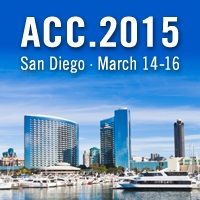ACC Meeting Preview: Changing the Practice of Cardiology
The American College of Cardiology 2015 Annual Scientific Session and Expo is set to begin March 14 in San Diego, CA. MD Magazine's editorial and video team will be there to provide breaking news, physician interviews, and analysis of the 3-day event. Some of the studies presented will likely change the practice of cardiology. Here's a preview.

Cardiologists from around the globe convening for the American College of Cardiology (ACC) meeting in San Diego March 14-16 are anticipating learning the results of major research trials in their field.
The list of meeting abstracts alone (there are 2,200) covers 34 categories from “arrhythmia” to “transcatheter aortic valve replacement,” and, including research summaries, is 48 pages long.
The featured speaker will be Stanford University Medical School physician-author Abraham Verghese, MD. His talk “I Carry your Heart” will kick off the meeting Saturday morning.
Several major studies will be presented, among them the PARTNER 1 trial of transcatheter or surgical aortic valve replacement and other studies on treating patients with arterial stenosis. A full list of scheduled late-breaking trial results is here. The research includes a report on PKSC9 inhibitors, how well their cholesterol-lowering properties do in changing cardiovascular outcomes. A study called EMBRACE STEMI will look at the efficacy of intravenous Bendavia (Stealth Biotherapeutics), a peptide drug that targets mitochondrial dysfunction, on reperfusion injury.
“It’s a fantastic meeting, “said Jeffrey Berger, MD, associate professor of medicine and surgery at NYU School of Medicine in the departments of medicine and surgery in the division of cardiology. The results of some of those trials are likely to “change practice for decades to come.” Berger is also the ACC meeting chair for the Acute Coronary Syndrome Pathway.
Among those studies are PEGASUS, a large-scale trial of the experimental anti-platelet drug ticagrelor (Brilinta/AstraZeneca) involving 21,000 patients. In January 2015, AstraZeneca announced the trial had met its primary efficacy endpoint. The trial is meant to determine whether the tablets at either 60mg twice daily or 90mg twice daily plus low-dose aspirin were effective in secondary prevention of atherothrombotic events in patients who had experienced a heart attack one to 3 years prior to the start of the study. The full results will be revealed at the ACC meeting.
“The very important question is what do you do with antiplatelet therapy a year after a heart attack,” said Berger.
Another major study that is eagerly anticipated is the PROMISE trial, he said. “It’s basically asking in patients who have blockages in the coronary arteries, which stress test is better?” Berger said, “Many health care providers are asking this—what test do you send these patients for.”
PROMISE compares the 2 different types of testing, functional and anatomic. Within those types are exercise tolerance tests, stress echocardiography, stress nuclear tests, and coronary CT angiography.
His prediction: “I think probably it won’t be a straight up victory for one or another, but there may be support to use test for one type of patient and one for another,” Berger said. Cost analysis will also play into those decisions, he said.
“We’ll be able to see the clinical results and the cost effectiveness,” he said, adding that “Cost today is a very important phenomenon.”
NYU SOM will also be presenting some “fascinating research,” Berger said.
The medical school is the clinical coordinating center for the ISCHEMIA trial, a huge NIH-funded study now in its third year. The acronym stands for International Study of Comparative Health Effectiveness with Medical and Invasive Approaches.
“We’re still in the middle of enrollment, targeting 8,000 patients from 33 countries, Berger said.
NYU’s Judith Hochman, MD has received a grant of $84 million from the NIH to study two approaches in treating patients with stable ischemic heart disease and moderate to severe ischemia. Hochman is the NYU SOM Harold Snyder Family Professor of Cardiology, director of the Cardiovascular Clinical Research Center and co-director of the Clinical Translational Science Institute. She is study chair. Berger is on the team as Midwest leader.
“We are really moving ahead in thinking about novel trials on how best to treat patients who have at least moderate ischemia on a stress test. Patients are being randomized to either an invasive approach or a conservative approach; regardless of what the results will be it will clearly change practice,” he said.
“We have found a lot of strong opinions out there in the world,” he said, “Some people believe you should got for that invasive approach—go into the cath lab, open up an artery—but just as many people on the other side say ‘You know what, we really don’t need to go there right away; let’s try some very good medicines and get these patients better’,” Berger said.
The verdict won’t be in for 4 or 5 years, he said. Right now “the question has equipoise,” Berger said, “I don’t which is better.”
Other NYU research, already reported in brief but due to be released in detail, includes a study showing the need to educate physicians about what to tell patients about following a low-fat diet versus a Mediterranean style eating plan and a ground-breaking study showing a direct correlation between exposure to air pollution and carotid artery stenosis. Berger and Jonathan Newman, MD are the authors of the air pollution study. It will be published in the Journal of the American College of Cardiology simultaneous to its presentation at the meeting, he said.
Berger discusses the conference in the videos below.